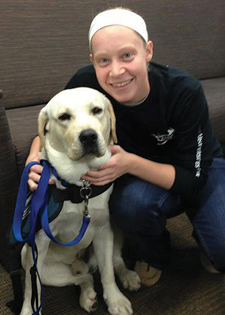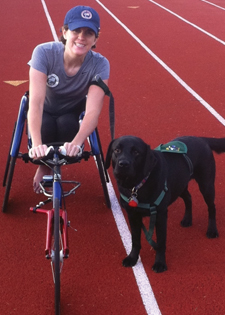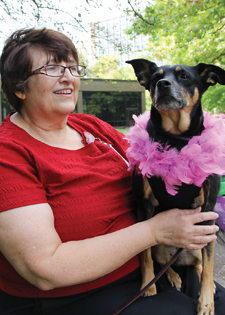Rehabilitation and Participation Science
Program in Occupational Therapy
 A successful service or therapy dog is the result of countless hours of training, patience and dedication.
A successful service or therapy dog is the result of countless hours of training, patience and dedication.
As an undergraduate student at Augustana College in Rock Island, Ill., Sarah Adam, MSOT/S ’15, became involved with Viking Pups, a service group on campus that trains service dogs for people in the community with disabilities.
“I had heard the great things that dogs could do to help alleviate some of the daily challenges in the lives of people with special needs and knew I wanted to be a part of that,” says Adam, who worked hard at demonstrating her commitment to the group. “At the start of my senior year, I was chosen to be a foster and team leader to Bobo, a yellow Labrador retriever.”
As his foster, Sarah lived off campus with “Bo.” As his team leader, Sarah was responsible for scheduling his training and participation in Viking Pup community events. Bo began his training with the basics of “sit,” “down” and “stay.” It immediately became apparent that Bo was not only a smart, calm and loving dog, but he was able to pick up on the emotions of those around him. Sarah and the other trainers could tell he would be a perfect fit for their new client, a 15-year-old girl with Williams Syndrome.
“It is difficult to put a number on how many hours per week we spend training the dogs, because they never leave our side. We had different formal training sessions with all of our dogs three times a week for about an hour, with 15-minute mini-training sessions every day,” recalls Adam. “However, every time I left the house with Bo to go to class, to the grocery store, to a restaurant or to work, he was training for his future client.”
 Future clients might include someone like Kerri Morgan, MSOT '98, OTR/L, ATP, an instructor in occupational therapy and neurology and two-time paralympian bronze medalist. Her service dog, Twix, was trained by C.H.A.M.P. Assistance Dogs, Inc., a not-for-profit that places dogs free of charge to qualifying individuals in the greater St. Louis metropolitan area. Twix, a black Labrador retriever, provides aid and companionship, which makes Kerri’s daily life easier. Twix’s tasks include picking up items, such as keys and shoes off the floor, retrieving items and opening doors. As a companion, Twix provides security and peace of mind.
Future clients might include someone like Kerri Morgan, MSOT '98, OTR/L, ATP, an instructor in occupational therapy and neurology and two-time paralympian bronze medalist. Her service dog, Twix, was trained by C.H.A.M.P. Assistance Dogs, Inc., a not-for-profit that places dogs free of charge to qualifying individuals in the greater St. Louis metropolitan area. Twix, a black Labrador retriever, provides aid and companionship, which makes Kerri’s daily life easier. Twix’s tasks include picking up items, such as keys and shoes off the floor, retrieving items and opening doors. As a companion, Twix provides security and peace of mind.
“In general, having a service dog makes me feel more secure. Just her presence alone makes me feel safer,” says Morgan. “And at the end of day, I have less pain because of the assistance she provides. That’s been a huge benefit to me.”
C.H.A.M.P. also trains therapy dogs like Dolly, who works with Regina Abel, PhD, a staff scientist in the Child Health and Education Laboratory in the Program of Occupational Therapy. Abel has been involved in Animal Assisted Therapy (AAT) for more than 13 years, with her first therapy dog, Kela, and now with Dolly, a small terrier mix. Abel and Dolly make scheduled visits to places including The Rehabilitation Institute of St. Louis (TRISL), where therapy dog teams work directly with physical, occupational and speech therapists during therapy sessions. The dogs become therapy tools and, with each subsequent visit, become more adept at meeting patient needs.
 “The only limit is in the imagination of the therapist, handler, patient and sometimes even the dog. The dogs are amazing motivators and can encourage extra effort while providing a welcome diversion to what can become physically and emotionally exhausting rehabilitation,” says Abel. “I have worked with patients who were previously unresponsive until a therapy dog was utilized. Brushing or sometimes just petting a dog can improve strength and mobility in an arm that has been damaged by stroke or injury. Dogs also command attention and are frequently used in cognitive and speech therapy.”
“The only limit is in the imagination of the therapist, handler, patient and sometimes even the dog. The dogs are amazing motivators and can encourage extra effort while providing a welcome diversion to what can become physically and emotionally exhausting rehabilitation,” says Abel. “I have worked with patients who were previously unresponsive until a therapy dog was utilized. Brushing or sometimes just petting a dog can improve strength and mobility in an arm that has been damaged by stroke or injury. Dogs also command attention and are frequently used in cognitive and speech therapy.”
During her first month in the Program, Adam met with both Morgan and Abel to discuss her interest in AAT and her hope to do research in utilizing AAT in a therapeutic environment for children with autism. She is also in the process of looking for another dog to train.
“There is a lot to consider when deciding whether or not to train a service dog. It is a big time commitment and a lot of responsibility,” Adams says. “Luckily, the faculty in the Program in Occupational Therapy have been amazingly supportive.”
We welcome inquiries from prospective students, potential collaborators, community partners, alumni and others who want to connect with us. Please complete the form below to begin the conversation.
Schedule an Info Session
We are excited that you are considering applying to the Program in Occupational Therapy at Washington University. Please join us for a Zoom Information Session for either our entry-level MSOT or OTD degrees or our online Post-Professional OTD. Current faculty members will discuss the degree program and answer any question you may have. We are offering these sessions on the following days and times. The content is the same for each one, so you only need to sign up for one.
Upcoming ENTRY-LEVEL Degree ZOOM Info sessions:
Schedule an Entry-Level Info Session
Upcoming PP-OTD Degree ZOOM Info session: